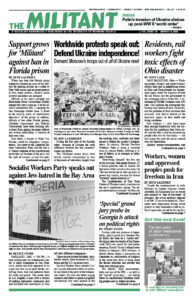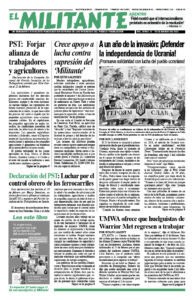March 16, 1998
One day after the tentative pact between the UAW and Caterpillar was announced, the New York Times opened a front page article with: “In what could be a blow to America’s traditional, smoke-stack worker unions, the United Automobile Workers today endorsed a proposed contract with Caterpillar.”
But what “could be” was not to be. Much to Caterpillar’s surprise the contract was rejected by 58 percent of the membership. After going through two strikes and having worked without a contract since 1991, UAW members have proven that they are not defeated.
The return of all the “illegally terminated” workers and opposition to dropping more than 400 unfair labor practice charges became the cement that held the rank and file together. The vote results were a vote for solidarity and labor’s time-honored principle: an injury to one is an injury to all.
March 16, 1973
British workers have set a day of national protest against the government’s wage freeze policies. The general strike, which would be the first one since 1926, was called at an emergency meeting of the Trades Union Congress. It coincides with a renewed crisis of the international monetary system. The British strikes and the turbulence of the world monetary system are intimately connected.
Prime Minister Edward Heath has imposed a wage-control program to strengthen the pound and bolster British competition. As in the United States, wages are controlled but food prices are spiraling. In the last two weeks the anger of British workers has exploded in massive protests.
The TUC leadership attempted to prevent any actions coming out of the emergency meeting. But the proposal for a protest strike was pressed through by an overwhelming vote.
March 15, 1948
The Democratic Party has been hit simultaneously by serious disaffection from its extreme tendencies on both sides. One section has already split off. Henry Wallace has taken a sizable chunk of the Democratic vote with him.
To counteract this, [President] Truman has had to start waving the New Deal flag and to issue a mild “civil rights program.” This has produced a new crack in the party. The Southern Democrats have taken the offensive and are engaged in a cold war with the administration.
What keeps the Democrat ship afloat? The labor bureaucrats come rushing to its aid, flinging the workers’ money around in a desperate attempt to save it. The real duty of all labor fighters is not to prop up the Democratic Party, but launch an independent Labor Party which could emerge at once as a major party on the American political scene.

